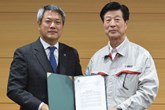Green Cargo releases new brake discs
Published by Alex Hithersay,
Editorial Assistant
Dry Bulk,
Green Cargo has released new brake discs for use on its mail wagons.
“Six of our mail wagons will be equipped with the new discs. This winter, we will be taking the wagons for test runs, letting them be part of the regular trains. The tests will run for most of next year,” says Bo Stenback, Head of Wagon Management and Maintenance at Green Cargo.
The new brake discs have several advantages, including the ability to replace worn units without having to dismantle the entire wheel pair. With the previous brake discs, the entire wheel assembly had to be lifted off and sent to the repair shop in Gothenburg. With the new brake discs, only the disc needs to be lifted off and it can be repaired onsite. Another advantage with the new brake discs is that service life has improved. This will lead to a reduced need for workshop visits.
“Our hope is that the switch will increase wagon availability and reduce standing time. The reason we’re making the change on the mail wagons specifically is because these are wagons that run on long routes and are exposed to a great deal of wear,” Stenback says.
The project is being conducted in partnership with Chalmers University of Technology in Gothenburg, which has installed sensors on the brakes to gather information on how the discs are working. This data will be of use to Green Cargo.
“During the test period, we will monitor the function and how wear affects the discs and the brake lining, for later evaluation. If the project is successful, more wagons will have their brake discs gradually replaced with new ones,” Stenback says.
Read the article online at: https://www.drybulkmagazine.com/rail-barge/17122018/green-cargo-releases-new-brake-discs/
You might also like
Oshima Shipbuilding’s multi-fuel-ready Ultramax bulk carrier concept receives LR approval
As the bulk carrier sector pursues lower and zero-carbon operations, such approvals help build confidence among shipowners, financiers, and charterers in new design solutions.

